Published Oct 27, 2022
Voyager's Caretaker: An Interview with Robert Picardo
The EMH reflects on his time on Voyager, the Doctor's relationships, and the impact of Star Trek.
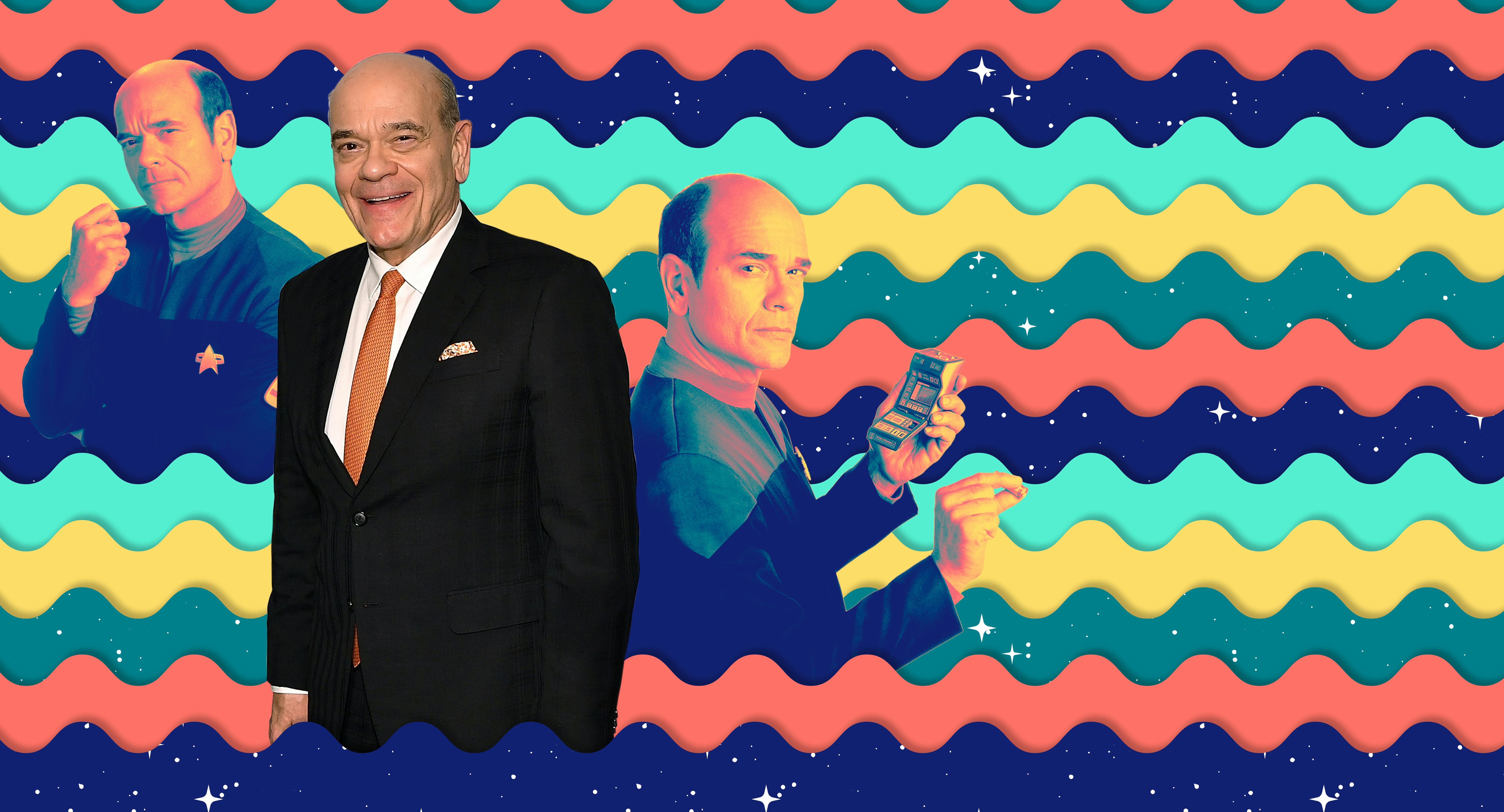
Getty Images / StarTrek.com - Rob DeHart
During their journey through the Delta Quadrant, Captain Janeway’s crew relied upon their starship’s Emergency Medical Hologram (EMH) to heal wounds, deal with various crises of the physical and mental variety, and occasionally sing a tune or two. Affectionately referred to as The Doctor, U.S.S. Voyager’s EMH evolved from a temporary failsafe program into an incredibly complex individual over seven seasons of Star Trek: Voyager.
StarTrek.com recently spoke with actor Robert Picardo who brought The Doctor to life, breaking down his thoughts about Voyager, the similarities between The Doctor and Data, the Borg Collective’s involvement on the show, the special relationship that his character forged with Seven of Nine, and his current pursuits.
StarTrek.com: Voyager’s premiere “Caretaker” debuted over 25 years ago. What was your first impression when you learned that your character would be a hologram?
Robert Picardo: Well, the audition was sent to me in the summer of 1994. I was appearing in a Lisa Loomer play called "The Waiting Room" at the Mark Taper Forum, playing a doctor with a terrible bedside manner, if you can imagine that. My agent sent me the script, and I remember that the character description was “a computer program of a doctor, colorless, humorless.” I didn’t know what that meant, and then I heard that he was a hologram. I knew a little more about the original Star Trek, but I wasn’t very knowledgeable about The Next Generation, so I didn’t know about the Holodeck. I couldn’t understand how a hologram could handle real instruments. I said, “How does he pick up a hypo?” How do you grab something when you have no material density?
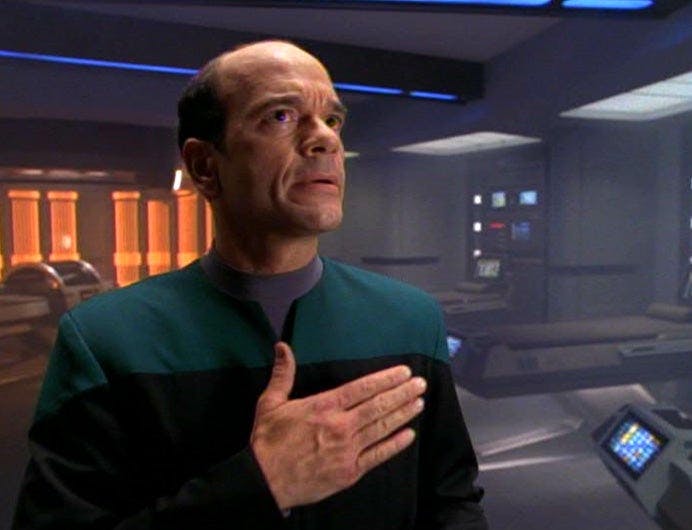
StarTrek.com
I turned down the audition for The Doctor, because it just didn’t sound interesting. It sounded like an automaton. I asked to read for Neelix instead, and I only asked because an actress friend of mine named Megan Gallagher had been on Deep Space Nine once or twice at that point, including the famous episode “Little Green Men.” Megan said, “There’s this other part, an alien named Neelix, why don’t you look at that?”
I read the script and I liked Neelix, so I asked to read for Neelix… and then I didn’t get Neelix [laughs]. I got close, I tested for Neelix. I heard after the fact that, between the studio and the producers, one set had me as their first choice and the other set had Ethan Phillips. Ethan is a dear old friend of mine who I had known for many years, but I didn’t know he was one of my competitors. I didn’t get that part, thank God, because I would never have had the patience with the make-up that Ethan Phillips did. The producers impressed me when they said they’d really like to see me for the original role they had asked me to audition for. Normally, once you have tested and you didn’t get the part, you are a used Kleenex and are discarded immediately.
My agent said that they wanted the character to be funny, and I later heard they had auditioned 900 actors. I don’t know if that’s true, but there were only nine lines to read. I told my agent that I didn’t get the joke, but I’d give it a shot. As a younger actor in my first two Broadway shows, I played unhappy young men with a chip on their shoulders who had to be funny when they were angry. I’m sort of generalizing, but the characters both had issues that were keeping them from living their lives in their early 20s. The first play was the overt comedy “Gemini,” which I recently mentioned on social media because Danny Aiello, who played my dad, sadly passed away. The other was a play with Jack Lemmon called “Tribute,” where I played his son.
I had a history of playing characters that you initially don’t like, but grow to like anyway. Characters who are still amusing when they are unhappy or angry. The Doctor was cranky, and I didn’t know why he was cranky. I didn’t understand the role at all. I faked my way through the audition and ad libbed a DeForest Kelley joke without knowing it was a DeForest Kelley joke. My last scripted line was roughly, “I believe someone has failed to terminate my program.” I added, “I’m a doctor, not a nightlight.” I ad libbed that line, which you shouldn’t do in an audition, but it got a big laugh and I was hired the next day. Then I had to figure out what the role was.
StarTrek.com: At the time, how familiar were you with the concept of what a hologram was?
Robert Picardo: I was confused, I didn’t know what it meant for him to be a hologram or a computer program. I didn’t understand enough about Star Trek “science,” which is based on real science. Although, we still don’t know how to make a hologram with density. So I got the part without knowing at all what I was in for, but I suppose anybody would’ve been in the same situation, really. It was mostly on the job training, so to speak.
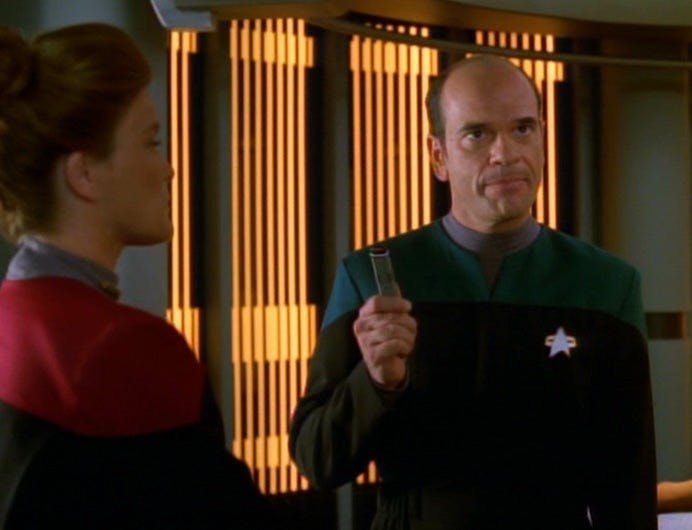
StarTrek.com
I had never seen a The Next Generation episode at that point, and I certainly didn’t know what the holodeck was. Someone told me that The Doctor was based on a popular character, because apparently they had a Professor Moriarty character on the Holodeck. Of course, that didn’t make any sense to me, because I didn’t understand that they did holographic recreations of literature. I just knew that they had some success with a hologram and now they wanted to make a hologram a regular. There’s no time to prepare in television, it’s not like you find out a month in advance and can do your homework.
StarTrek.com: Did you see any correlation between your character and Data from The Next Generation?
Robert Picardo: Once I got the part, they gave me ten episodes of The Next Generation to watch. They were mostly medical shows, but Brent Spiner was so great as this android that I said to myself, “Oh, now I’m going to be compared with him [laughs], and people love him! The problem will be to not be a letdown as the next generation of artificial intelligence.”
I got the part without understanding that the character would be the outsider, the Spock-like character. The character who initially inherited that was Data, who had no emotion and longed to be a real boy in the same way as Pinocchio. I thought that, because Tuvok was a Vulcan character, he would deal with those issues. Once I realized that I had gotten the plum role, it was a delightful surprise. I went from thinking I had the dullest role in the show to believing I may have the best role in the show. That was a little daunting.
StarTrek.com: The Doctor’s holographic nature initially kept him confined to Sickbay. Do you believe that this created additional challenges for you as you sought to develop the character?
Robert Picardo: I think it was actually a benefit for me, because it made the character unique and captured the audience’s imagination. As an actor, I benefited from the character’s limitations, because it set him apart in the audience’s mind. Having said that, I had to keep certain things in mind. I was supposed to look identical every day for seven years, which is impossible when you’re a human who is aging and overeating during the Christmas break.
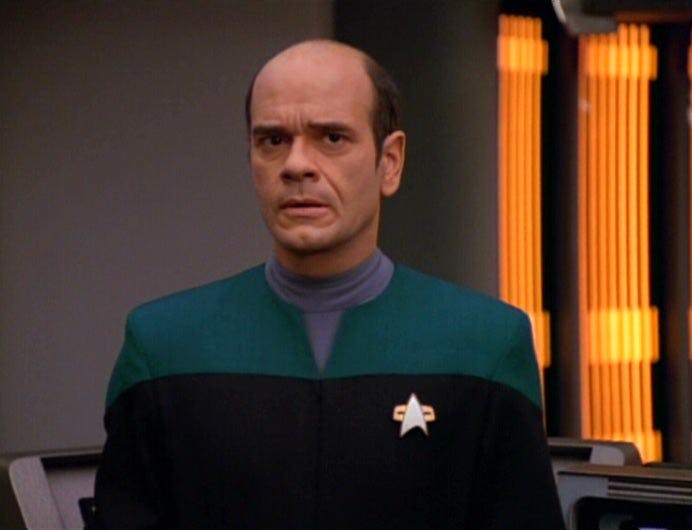
StarTrek.com
I had seen Brent’s performance and noticed he had an artifice in the way that he moved that set him apart from regular humans, and as a hologram I didn’t really have to do that. I’m not a piece of hardware with servomechanisms controlling the movement of my arms. I’m a creation of light and all that, I could just as easily have bad posture. But I understood that the character had to appear artificial and that his basic arc involves him growing more like a person, so I needed to start with an artifice in the way I stand, move, and speak. I stood up straighter and forced my shoulders back in a way I had never done before and based my posture on an old corporate mascot named Reddy Kilowatt [laughs].
With The Doctor being an extension of the computer system, I could never pause when he spoke about something within his expertise and say, “Um, well.” I had to spew information as if I were reading it out of a textbook. The hardest challenge for me, and I’m sure Brent had it as well. Therefore, I could never pause, stumble over a word, or say something that was not grammatically correct.
All bets are off when it’s outside of my expertise. I can muse, ruminate, or not know what the next step is if it’s something in a human interaction that I didn’t understand. When I’m on my game, I had to know my lines cold and speak them as quickly as possible. Since science fiction is so expositional, I believe the key to a successful science fiction television show is to have at least a third of your cast members be able speak with tremendous speed. We had Roxann Dawson, Kate Mulgrew, Ethan Phillips, and myself who were all very good fast talkers.
StarTrek.com: How did you react when you learned that the EMH would be given a mobile emitter and have the ability to exist outside of Sickbay?
Robert Picardo: I remember I was in [Voyager producer] Brannon Braga’s office when he told me. He said, “Your character is so popular, we need to be able to put you in more scripts, in more situations and settings. What do you think?” I said, “I think it’s a bad idea.” [laughs] This was one time when I was clearly wrong and the producers were absolutely, a 100% right. I conveyed to him exactly what I described to you earlier, that the character’s differences define him and make him interesting to the audience. If I’m not limited to the Sickbay or the Holodeck, then I’ll just be like anybody else. I’m glad they did it, as it gave me many more stories. But because the character had been kind of a break-out character… whenever somebody plans to mess with a winning formula, I think anyone’s reaction would be, “Are we sure we want to do that?”
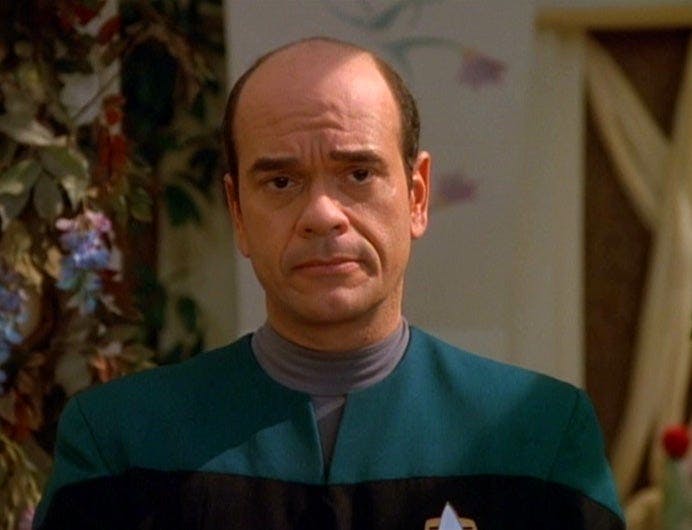
StarTrek.com
StarTrek.com: Voyager underwent a significant transition at the beginning of its fourth season, as Seven of Nine joined the crew and the Borg Collective became a recurring threat to the ship. Did you foresee just how much the addition of the Borg would alter the course of the series?
Robert Picardo: No, I didn’t. Basically, what happened is that Seven’s character was suddenly assigned storylines that would have been The Doctor’s in the first three seasons. Had I realized they were going to do that, I might’ve been trepidatious. When I heard that Kes wasn’t coming back, I did go in to Brannon’s office and say, “I’m concerned again.”
Now remember, I had been wrong about the mobile emitter [laughs]. But I explained that Kes had really been The Doctor’s mentor. Officially, he’s mentoring her as a medical assistant, but she has been mentoring him and developing his humanity. My concern was that she’s been his emotional sounding board, his confessor. The moment she’s gone, The Doctor is just going to go back to being a buffoon and a windbag. He’d never open himself up to another crew member at this point.
Brannon Braga’s exact words, as I recall them, were, “Well, see if there is a unique way that you can relate to our new character Seven of Nine.” I gave it some thought, and I read the first script or two that they had available before we started shooting that season. I went to Brannon and suggested that we take the relationship that The Doctor had with Kes and we turn it around. So The Doctor thinks that the best person to teach Seven of Nine how to become human again is him. In other words, he’s a better teacher on how to be a human being than a real human being.
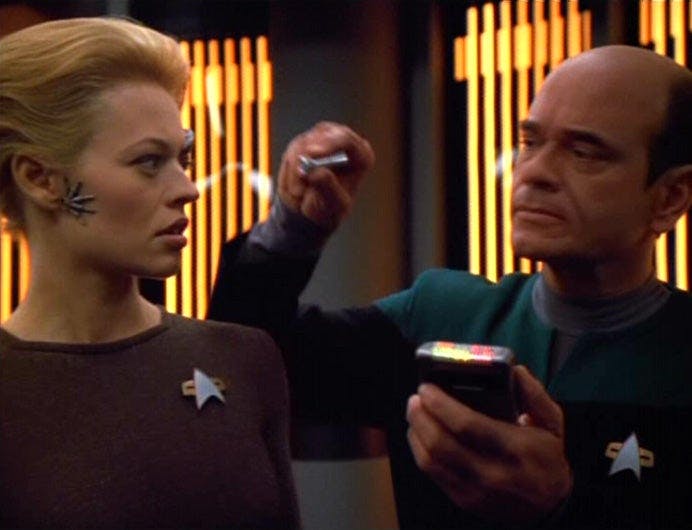
StarTrek.com
I explained that we’d get some comic value out of his arrogance and ego. We would literally have roleplaying scenes where I would teach her appropriate behavior in different circumstances. That was the suggestion. They liked the idea, ran with it, and made it much better than I could ever have imagined. Eventually, that culminated in “Someone to Watch Over Me,” akin to Professor Higgins falling in love with his pupil in “My Fair Lady.” The Doctor starts teaching mostly out of arrogance, and then he ends up falling in love with her.
That suggestion afforded me four seasons of great scenes with Jeri Ryan. I don’t know what their intent was for our relationship, but the specific suggestion of roleplaying scenes to teach appropriate behavior coming from a hologram who previously couldn’t behave remotely human enough for a patient to take him seriously is inherently funny. It never really occurred to me before, but think about when they took the Frasier character from Cheers and made him the center of his own show. In order to normalize an eccentric character like Frasier, they had to give him a brother who was more eccentric than he was.
It’s not unlike that. I used to be the artificial intelligence character who carried the B-storylines. What is my entitlement as a crew member, even if I’m not organic? Seven of Nine basically took all of those entitlement stories. I know I was your former enemy, now I am your friend. I know you don’t quite trust me, but what am I entitled to here? When will you trust me as much as a regular crew member? She took over the burden of those stories, and I had been carrying those storylines for three seasons.
I kind of had to move aside. At times, I still got those storylines when we did a show like “Author, Author,” where The Doctor was writing a book and it became a story about intellectual property rights for a character that isn’t organic. But mostly, Seven took over those storylines. I became her sounding board, mentor, sidekick, and occasionally someone who was learning lessons alongside her.
StarTrek.com: You made a cameo as the U.S.S.Enterprise-E’s EMH in Star Trek: First Contact. Was any research about the Borg involved in your preparation for that role?
Robert Picardo: Right, because that was before the Borg were on our show. I don’t specifically recall. At that point, I had seen the Borg in The Next Generation and knew what they were. Any specific preparation? I don’t think so.
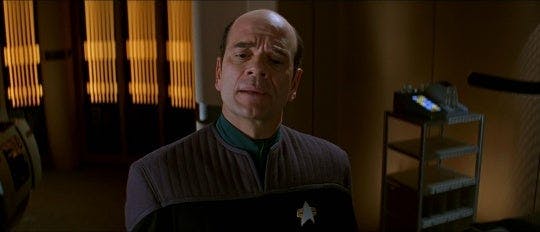
StarTrek.com
StarTrek.com: Many fans consider the Borg to be the most powerful adversaries that the Federation ever faced. What traits exhibited by the Borg make them such a fearsome enemy?
Robert Picardo: Well, the most terrifying thing is having your mind controlled. Your individual will is completely subjugated, and there’s a hive mind telling you what to do. That’s the scariest part. Then all of the other things about being dismembered or having cybernetic pieces put in. It’s a human being reduced to a machine.
StarTrek.com: The Doctor was responsible for Seven’s healthcare and also assumed a mentorship role as she sought to learn about social relationships. To what extent did this platonic bond contribute to the romantic feelings the EMH developed for Seven?
Robert Picardo: Honestly, they were just great friends. There were occasional things that could be seen as slight flirtations, but I don’t really think we were ever supposed to consider them more than just friends or confidants before “Someone to Watch Over Me.” There’s a moment when we’re singing “You Are My Sunshine,” and Robbie [Robert Duncan McNeil] directed that episode. When I read it, I thought it was corny and wouldn’t work. Yet when I watch the show, it gets me every time [laughs]. It’s totally believable that, in one second, he looks at her differently. I thought that was a linchpin episode for their relationship. You couldn’t go back from that one. Once you made that turn, it was never the same. He had a secret crush and a place in his heart for her that couldn’t be dealt with every week, but I think that once the audience had seen it they never quite forgot that the teacher had a crush on his star pupil.
Jeri was just so much fun to work with, she has a great sense of humor. Looking back on the show, I felt the best scenes were the ones that I had with Kate [Mulgrew] and the ones I had with Jeri. They’re very different actresses, very different people. I adore them both, and I always looked forward to working with both of them. Kate is just a master. All of the command that was essential to her role, she has as a person and an actor. That’s why it comes across so well. She’s an enormous talent, immaculately prepared, super smart, has tremendous instincts, all of those great things.
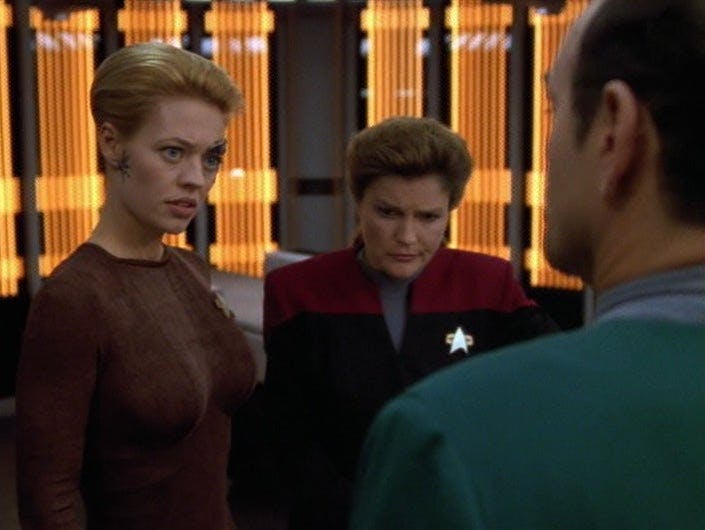
StarTrek.com
I think I had more scenes with both of them than anyone else. The runners-up to them would be my dear old friend Ethan Phillips, who I met when we were both doing hit plays in New York in 1977. That was a great relationship, because Neelix annoyed The Doctor and it was fun to play that. And Robbie McNeil, I had some really nice stuff with Tom Paris. After Kes went, he became The Doctor’s teacher and part-time medical assistant. However, I’m happiest about making the suggestion for the relationship between The Doctor and Seven. I feel I would have had the scenes with Kate anyway, they would have been a part of the producers’ initial concept for where my character would go. I think I may have exerted some influence over my own destiny in terms of The Doctor and Seven of Nine’s relationship.
StarTrek.com: Would you have changed anything about the course of The Doctor’s friendship with Seven?
Robert Picardo: Well, first of all, there’s a lot of teasing about them ending up together, but I’m only kidding about that. I think it would not have been appropriate at all, it’s much better to have the audience wish for something than for it to actually happen. I do not wish that we ended up together. I do think it was a little strange that they paired her with Chakotay at the last minute [laughs], but that’s okay. The Doctor had plenty of romance for a hologram over seven years. At one point at the end of Season 3 or early in Season 3, the other male cast members actually complained that The Doctor had been kissed by beautiful women more often than any of the other actors [laughs].
StarTrek.com: In the episode “Body and Soul,” The Doctor’s program was hidden in Seven’s cortical implant and briefly controlled her actions. In your opinion, was this story a metaphor for the manner in which our society often overlooks a woman’s right to have dominion over her own body?
Robert Picardo: That’s a very interesting metaphor. I did not see that metaphor, I thought the episode was toying with our feelings about being rigidly programmed in relation to sexual attractiveness. In a similar way that Deep Space Nine dealt with the Trill, where they put the same soul into a female body instead of a male body. It suddenly becomes homoerotic to someone who is rigidly holding on to stereotypes. I thought it was toying more with that, but I like your theory much better. I don’t recall thinking of that at the time, though.
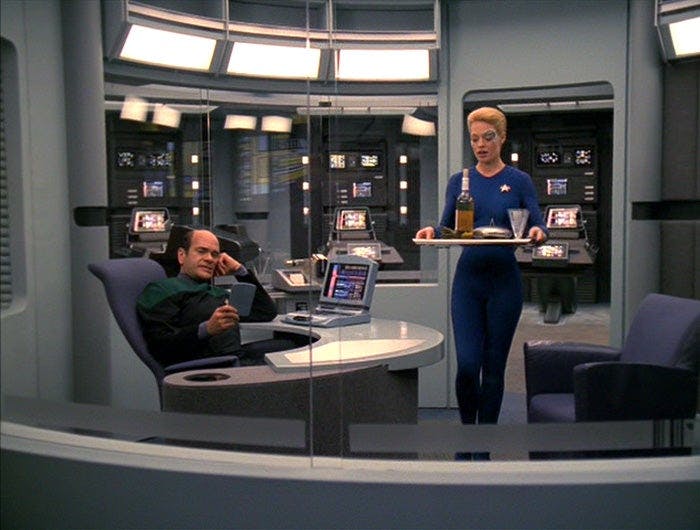
StarTrek.com
I was in a popular movie called Innerspace in the 1980s. I played a macho character that has to impersonate the lead of the movie, played by Martin Short. During the sequence where they take my facial features and put them on Martin Short, I’m supposed to have the soul of a nerdy, frightened weakling inside the body of a powerful character. When I had to be Martin Short inside my body, I suggested to the director that he should shoot Marty reading the scenes so I could watch his performance and take from it what I could.
When we were doing “Body and Soul,” we had this exact issue. My recommendation to Robbie McNeil was to let me shoot all of Seven’s scenes in a rehearsal so that Jeri could pick and choose what she liked from it. Jeri just totally went for it. I remember a message coming down from the front office and the producers saying to Jeri, “Are you sure you want to make yourself that unattractive?” [laughs] Which I took personally, of course.
Part of the fun about my character is that I could over act and then underplay. I could surprise the audience in a way that the other crew members couldn’t, because there were no rules for me. I could play all of these negative qualities that a brave Starfleet officer is not allowed to play. When you put The Doctor in a situation outside of his medical expertise, I could be cowardly, petulant, and childish. I could have all of these negative qualities and then rise to the occasion, so to speak.
StarTrek.com: The episode “Message in a Bottle,” which is a personal favorite of mine, also has an anniversary this month. Did you infuse more of your own personality into The Doctor than normal for that episode?
Robert Picardo: That’s hard to answer. I didn’t know much about Andy Dick, he was obviously very popular. There was a bit of a generational difference, but I distinctly remember the moment I met him. Andy smiled and said, “Your name Picardo is so close to Picard, do you get teased a lot?” So I said, “Wait a minute. Your name is Andy Dick, and you’re going to make fun of my name?” He laughed and we got along unbelievably well from that point on. We had a really great time together.
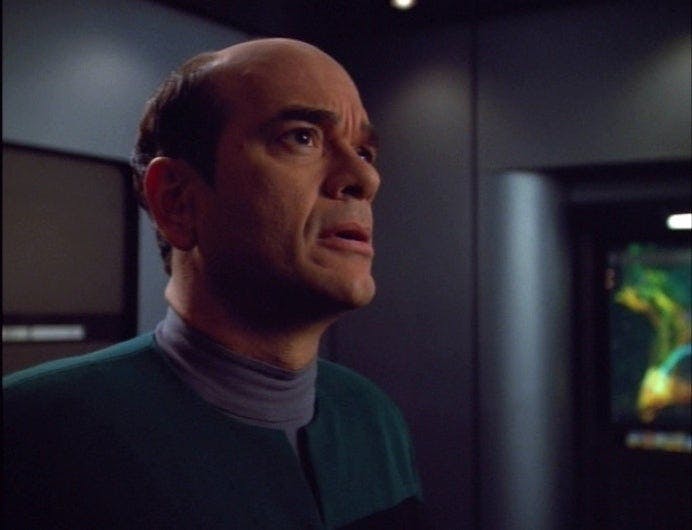
StarTrek.com
StarTrek.com: You are a passionate advocate for science and a member of the Planetary Society’s Board of Directors. How has your involvement with these causes impacted your life?
Robert Picardo: When I was first recruited by the Planetary Society, Voyager had been on the air for about three years. There was a fundraiser for Ray Bradbury’s birthday, and they had actors who had agreed to be in a reading. Charlton Heston, John Rhys Davies, John de Lancie, and Tim Russ... we were all asked to be in this reading. Afterwards, the two surviving founders called me and asked me to be on the advisory board. They knew I had an interest in science and had been a biology major for a year and a half.
I agreed and understood they wanted me to help bring their message to the science fiction fandom. It wasn’t as if I was going to suddenly pretend I knew more about space exploration than I did. To be completely honest, I was not knowledgeable about it. I lived through the Apollo Moon landing and experienced the same excitement and thrill that we all did, but I wasn’t particularly conversant with the other missions. What I began to understand at that moment was that Star Trek affords you certain opportunities. You’re a part of a saga that has inspired so many people to pursue careers in space exploration, technology, engineering, and science, and you’re suddenly given access and welcomed in to a club that you’d never be in otherwise.
I sat on stage with five men who had walked on the moon at Star Trek’s 30th anniversary and felt a little ridiculous. I thought, “What am I doing here?” But the audience doesn’t make you feel ridiculous, and more surprisingly the astronauts don’t make you feel ridiculous about it! [laughs] I could either find this opportunity uncomfortable or I could embrace it, and I chose the latter. I felt that if I’m going to meet all of these cool people, then I’m going to ask questions, use the access I have to try to do something positive, and try to get more public involvement. By and large, science fiction fans tend to be science fans anyway, and if they don’t know that you can help them realize it. I decided to take that opportunity and bring the message to the Star Trek community. If you think Star Trek is cool, look how cool what we’re actually doing now is.
During Voyager, I was involved with some of the Planetary Society’s educational challenges for young people. The Mars rover Sojourner landed early on in Voyager’s tenure on the air, and the Planetary Society had a strategic partnership with the LEGO company. High school kids could build their own Mars rover and ship it to a competing high school. Meanwhile, each high school constructed their own Martian surface that the rest of the schools never got to see. So the first school who shipped their rover would telecommunicate and command their rover to explore the unknown Martian surface at the other school and send the data back over the internet. This was called Red Rover. I visited schools in Los Angeles and saw the kids involved with the project.
I [also] think I’m the only Star Trek actor to arrange to have a public service announcement shot on a Star Trek set. It was a commercial for the Mars Millennium Project, which was designed to get kids interested in astronomy. About three years ago, I received an email from a young woman who had seen that public service announcement while she was watching Voyager as a thirteen year-old, and it changed her life. She entered the competition, won, studied in Montreal, and ended up becoming an astronomer. The last line in her email was roughly, “If you ever wonder whether committing your time to inspire young people makes a difference, I’m here to tell you it does.” So that was wonderful and made me very grateful that my involvement with the Planetary Society had been presented to me entirely because of my work on Star Trek.
StarTrek.com: Between your science advocation work and acting, it sounds as though describing your schedule as a hectic one is surely an understatement. What other projects are you currently working on?
Robert Picardo: In the last year, I was back on stage in New York. That was great fun. I did a musical called “Enter Laughing,” based on the Carl Reiner book. It was hard to do theater while filming Voyager, but after that I’ve done quite a bit of it in California. It was fun to be back at the scene of the crime, so to speak, as I began my career here in Manhattan. I’m presently playing a recurring character on an Apple TV+ series called Dickinson. We’re just finishing up season two of that. I also recently started playing a recurring character on a BET show called The Family Business, with Ernie Hudson. I play a bad guy, a gangster-type on that show.
Since I’m based on the east coast again, I’m not as able to do my monthly Planetary Post videos for the Planetary Society. They’re more sporadic, which is one thing I regret. One of my resolutions is to get back to doing more of them. There are certainly other irons in the fire, and things that could and may happen, that I can’t speak about.
This article was originally published on January 15, 2020.
Jay Stobie (he/him) is a freelance science fiction writer who contributes articles to the official Star Trek website and Star Trek Magazine. He can be found on Twitter and Instagram at @StobiesGalaxy.
Stay tuned to StarTrek.com for more details! And be sure to follow @StarTrek on Facebook, Twitter, and Instagram.

